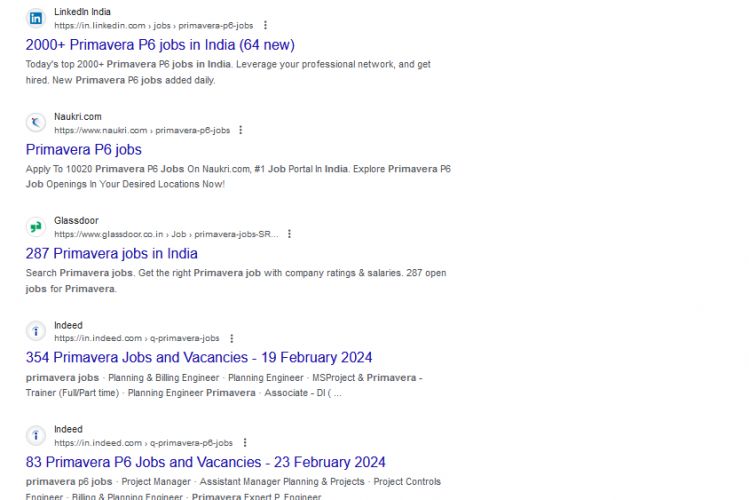Primavera Training by Experts
Our Training Process

Primavera - Syllabus, Fees & Duration
Here's a suggested syllabus for a Primavera course, progressing from basic to advanced concepts:
Basic Level:
-
Introduction to Project Management Software
- Overview of Primavera
- Importance of project management software in planning and scheduling
Getting Started with Primavera
- Installation and setup
- Interface overview
- Creating a new project
Creating Work Breakdown Structure (WBS)
- Understanding WBS
- Creating and organizing activities
- Assigning codes to activities
Adding Relationships and Constraints
- Dependency types (Finish-to-Start, Start-to-Start, Finish-to-Finish, Start-to-Finish)
- Adding relationships between activities
- Applying constraints to activities
Intermediate Level:
Scheduling Techniques
- Critical Path Method (CPM)
- Understanding float and total float
- Analyzing the critical path
Resource Management
- Adding and organizing resources
- Assigning resources to activities
- Resource leveling
Baseline and Tracking
- Creating baselines
- Tracking progress against baselines
- Updating schedules
Advanced Level:
Project Analysis and Reporting
- Generating reports (Gantt charts, resource usage, cash flow, etc.)
- Analyzing project performance
- Earned Value Management (EVM) techniques
Risk Management
- Identifying project risks
- Incorporating risk management into schedules
- Mitigation strategies
Advanced Features
- Global changes and filters
- Multiple project management
- Customizing layouts and views
Integration with Other Software
- Importing and exporting data
- Integration with Excel, Microsoft Project, etc.
Advanced Topics
- Portfolio management
- Multi-project analysis
- Advanced scheduling techniques (PERT analysis, Monte Carlo simulation)
Each module should include hands-on exercises and practical examples to reinforce learning. Additionally, regular assessments and quizzes can be incorporated to gauge understanding and progress throughout the course.
This syllabus is not final and can be customized as per needs/updates





 This enables companies to demonstrate compliance with project management best practices, regulatory guidelines, and contractual obligations, reducing the legal and financial risks associated with non-compliance. Integrating risk management capabilities into project planning allows project managers to anticipate potential disruptions, develop contingency plans, and effectively mitigate risks, making projects more resilient. You can take action. Monitor and control your project in real time:
Primavera provides comprehensive monitoring and control capabilities that allow project managers to track project progress in real time. can. Primavera provides tools to identify, assess, and mitigate risks associated with project activities. . Primavera facilitates communication between project stakeholders by providing central access to project information, progress reports, and documentation. In summary, the importance of learning Primavera is that it provides project managers with the tools, techniques, and skills they need to effectively plan, execute, monitor, and control projects of varying sizes and complexities.
Improve communication and collaboration:
Effective communication and collaboration are essential for project success.
This enables companies to demonstrate compliance with project management best practices, regulatory guidelines, and contractual obligations, reducing the legal and financial risks associated with non-compliance. Integrating risk management capabilities into project planning allows project managers to anticipate potential disruptions, develop contingency plans, and effectively mitigate risks, making projects more resilient. You can take action. Monitor and control your project in real time:
Primavera provides comprehensive monitoring and control capabilities that allow project managers to track project progress in real time. can. Primavera provides tools to identify, assess, and mitigate risks associated with project activities. . Primavera facilitates communication between project stakeholders by providing central access to project information, progress reports, and documentation. In summary, the importance of learning Primavera is that it provides project managers with the tools, techniques, and skills they need to effectively plan, execute, monitor, and control projects of varying sizes and complexities.
Improve communication and collaboration:
Effective communication and collaboration are essential for project success.



















































































